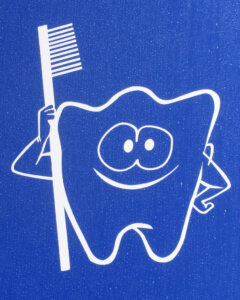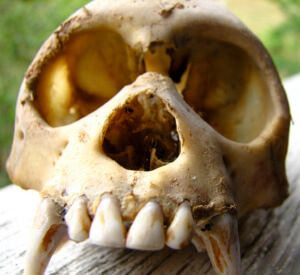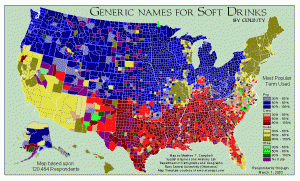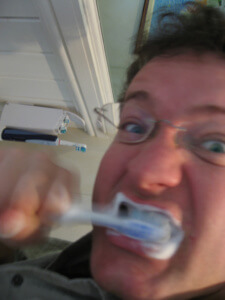What Causes Tooth Enamel Loss?
There are multiple ways to find yourself looking for the answer to What Causes Tooth Enamel Loss?
And, it’s typically tooth pain that leads you to an article like this.
So, first of all, we’re sorry for your loss… of enamel.
Is It as Easy as Clicking on this Link to Restore your Enamel?
The reason we decided to tackle this topic was that while searching for new methods to whiten your teeth, we found several suggestions that might help to whiten your teeth. But, many of these suggestions only made your teeth whiten by thinning out your enamel.

“Tooth 03” by Tom Hilton (CC BY 2.0), via Flickr.com
Here are the top reasons for what causes tooth enamel loss:
- It’s in the genes (genetics)
- Grinding of your teeth
- Starchy food
- Excessive brushing
- Brushing with abrasive toothpaste
- Those pesky (but, delicious) soft drinks
- Acidic drinks
- Foods high in sugar
- Acid Reflux (GERD)
- Certain medicines
- Dry mouth (Xerostomia)
What is Tooth Enamel?
We recently wrote an article about the different parts of the tooth. In this article, we talk about enamel, what it is made up of, and how it relates to the whiteness of your teeth.
The important thing you need to know, is that enamel is the outer layer of your tooth.
If you are losing the thickness of your enamel, you could be in for a painful dentist visit if you allow your enamel to continue to degrade.
Why is Tooth Enamel Important?

“IMG_5012” by Saulo Pratti (CC BY 2.0), via Flickr.com
One primary reason tooth enamel is important, is that it it he hard surface of your teeth that allows you to chew your food.
Enamel protects the rest of your teeth from elements.
Without your enamel, the nerves inside your teeth would be exposed. If you have exposed nerves, anything hot or cold would travel straight to your nerve.
I guess one way to describe it would be that having an exposed nerve would be like eating with utensils that have a wire directly connected to your wall outlet.
Another reason you need to find out what causes tooth enamel loss is that the rest of your teeth are not hard enough to weather the punishment that eating inflicts on your teeth.
So, without enamel, you would quickly be gumming your food.
Why Do These Causes Erode Your Enamel?
Above we listed several of the potential Causes for What Causes Tooth Enamel Loss.
Let’s dig a little deeper into each of these Causes and why each of them cause tooth enamel loss.
Before we start digging, let me just say that while all of these are potential Causes of enamel erosion, that doesn’t mean your enamel is absolutely eroding.
Many of the Causes we list may not result in enamel erosion for you specifically. There may be other traits that you have that allow you to not be affected.
Soft Drinks
According to the World Dental Association:
This, of course, does not mean that you can’t drink soft drinks at all! Or, whatever you call them. Soft drinks, soda, Coke, pop, or something else!

“Pop vs Soda Soft Drink Survey” by Ed Kohler (CC BY 2.0), via Flickr.com
You just shouldn’t drinks that have strong acidity all day long.
You might think that high sugar content is one of the leading factors. But, studies have also found that sugar-free soft drink are also highly erosive.
This is especially important for young adolescent children whose teeth are still growing.
If you are experiencing pain in your teeth, and you are drinking a fair amount of soft drinks, you might consider cutting back and trying a remineralizing toothpaste to see if that gets your pain under control.
Acidic Drinks
Acid in general is extremely bad for your tooth enamel.
So, consuming acidic drinks on a regular basis is not a good idea for most folks.
Here are a few drinks or drink additives you should consume in moderation:
- Lime juice
- Lemon juice
- Cranberry juice
- Many sodas (Gatorade, Pepsi, RC Cola just to name a few)
- Hawaiian Fruit Punch (which I LOVE)
The folks at 21st Century Dental put together an extensive list of drinks that eat teeth that you should read to know what drinks to use in moderation.
We are not saying you can’t drink acidic drinks at all.
But, if you are experiencing sensitivity with your teeth, you should probably either avoid drinks like these, or you should make sure you rinse and/or brush your teeth immediately after consumption.
We were especially disappointed in Dr. Oz and his recommendation to whiten your teeth using a combination of baking soda and lemon juice.
The dentist Michael Barr DDS, was especially critical of this Dr. Oz advice. The strong acidity of lemon juice used regularly might whiten your teeth. But, at the expense of losing enamel thickness.
Food That’s High in Sugar Content

“Self portrait – Candy is dandy!” by MattysFlicks (CC BY 2.0), via Flickr.com
Food that is high in sugar content can often be thick and sticky.
When a food has that kind of viscosity, it can often stick to your teeth. This give sugar a longer period of time to infiltrate your enamel.
And, studies have shown that sugar has a direct effect on the number and severity of cavities.
Sugar mixes together with bacteria in your mouth to create acidic substances. We’ve already talked about how acids wear down enamel.
High sugar foods aren’t always easy to identify. Some alternate names to look for are:
- Corn syrup
- Syrups
- Fructose
- Galactose
The folks at Prevention put together this fantastic list of alternate names for sugar. So, when you are shopping, read the labels so you know what you’re buying.
Genetics
What can you do to fight genetics?
Well, thus far, not a whole lot to completely beat genetics.
But, knowing that genetics are working for or against you can be a wonderful shield of protection.

“grandparents” by rakef (CC BY-ND 2.0), via Flickr.com
If you are able to find out your parents and/or grandparents resistance to cavities. And, if you can better understand their eating habits, this can give you valuable information about how you might react long term to various foods.
You might be surprised to find out that Grandma had to give up a certain candy treat when she was younger to help her get over tooth sensitivity.
You can use this information to as a guide for ways to fight enamel problems earlier than if you didn’t know this information.
This information can also be helpful to pass along to your children when they are old enough.
Scientists have found that the AMELX gene is related to enamel growth. They have figured out that this gene provides the genetic instructions for how to make a protein called amelogenin. The amelogenin protein has been found to be critical in enamel development.
Starchy Food
Scientists have also found that starchy foods when combined with sucrose can have negative affects with regards to cavities.
They have also found that while starches are erosive to your enamel, that they even more erosive to your dentin.
Like sugars, starches also combines with bacteria in your mouth to create acids. Once again, it’s the acids in your mouth that are the most erosive.
Physical Factors
How much stress you put into your teeth can be another strong factor for what causes tooth enamel loss.

“Brushing my teeth” by Kai Hendry (CC BY 2.0), via Flickr.com
These physical activities and/or motions can wear holes in your enamel:
- Aggressive brushing
- Brushing with toothpaste that has too much grit
- Teeth grinding
- Physical activity
- Dry mouth
There are many studies (here’s one; and another) that conclude that abrasive activities applied to your teeth do affect the depth of your enamel.
It’s not difficult to understand why. The same concepts of sanding and planing of woods apply to your enamel.
The good news is that your enamel is a living part of you that is constantly growing. And, enamel is one of the hardest parts of your body.
So, for most people, normal brushing, even with a somewhat abrasive toothpaste, won’t cause dental problems. You just have to be careful that your aggressive brushing and amount of grit don’t exceed your enamel growth rate.
One surprise we found while researching this topic was that physical activity seems to have some correlation to enamel erosion.
In this study various age groups were studied. The results showed that “high proportion of physically active young adults have erosive lesions”.
What seems to be happening here is that exercise and other physical activities cause you to sweat and to lose the liquids in your body. The loss of body fluids reduces the fluids in your mouth causing you to have a dryer mouth.
Saliva is produced by your body to fight the bacteria in your mouth. These are the bacteria that combine with sugars and starches that you’ve eaten to produce acids. Once these bacteria morph into acids, they erode your enamel.
During our research for the reasons for What Causes Tooth Enamel Loss?, many of the Causes eventually have a root cause of dry mouth. Or, some factor that results in a reduction of saliva.
Medicines

“Pills” by mattza (CC BY-SA 2.0), via Flickr.com
Some medicines can be the answer to what causes tooth enamel loss.
Several medicines can have the side effect of reducing the saliva in your mouth. Like we’ve talked about before, saliva protects your mouth by killing off bacteria. So, the more bacteria, the more it can combine with other substances (like sugars and starches) to create acids.
And, acidic fluids are a direct enemy of enamel.
Here are some medicines and/or drugs that are known to have dry mouth side effects:
- Aspirin
- Antihistamines
- Antidepressants
- Antibiotics
- Anti-diarrhea
The folks at Healthgrades put together a nice Top 10 list of medicines that have the side effect of dry mouth. So, take a look and talk to your doctor if you think you might be suffering from dry mouth and it is affecting your teeth. Your doctor might be able to move you to an equally effective medicine that doesn’t have that side effect.
What To Do About Enamel Loss?
What can you do about tooth enamel loss?
Now that you know what causes tooth enamel loss, you can reduce and/or avoid altogether these Causes.
Is It as Easy as Clicking on this Link to Restore your Enamel?
You can also uses some of the tactics we’ve described above to offset some of the Causes.
You can also work with your dentist to see which changes you make are helping and which ones aren’t helping.
We hope we’ve helped to answer the question What Causes Tooth Enamel Loss?
Sorry, the comment form is closed at this time.